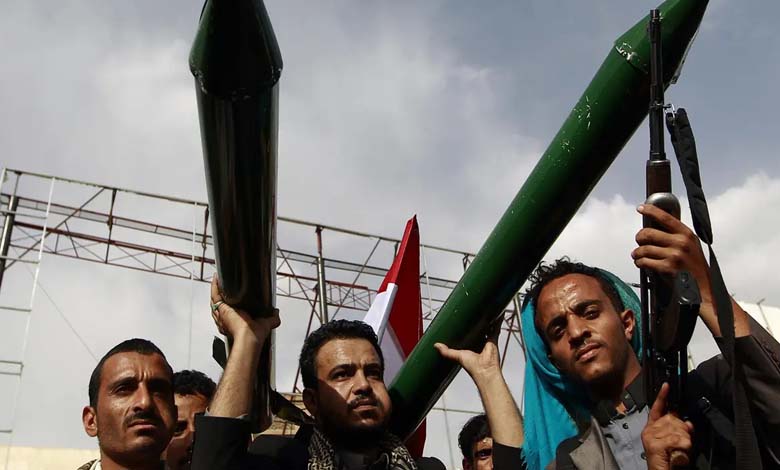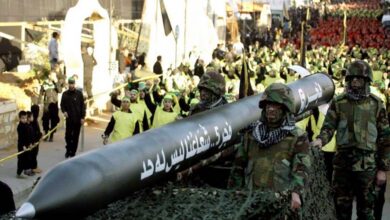The UN Exposes the “Opportunistic Alliance”: Collaboration between Houthis and Al-Qaeda in Yemen

A military and intelligence alliance has recently emerged publicly between Houthi militias and Al-Qaeda in Yemen, aimed at destabilizing the country and region, and threatening international navigation.
-
Following in Daesh’s Footsteps… The Houthis Spoil Yemeni Celebrations
-
Houthis Don’t Make Their Own Decisions… Iran Launches Attacks and Attributes Them to Houthis… A Senior Official Reveals the Truth
A UN report revealed coordination and collaboration between the Houthis and terrorist organizations such as Al-Qaeda and Al-Shabaab in Somalia, to target forces aligned with the Yemeni government.
An Agreement and Cooperation between Houthis and Al-Qaeda
The report by the Panel of Experts on Yemen, submitted to the Security Council on October 11, indicates increasing cooperation between the Houthis and terrorist groups like Al-Qaeda, expressing concern over this alliance.
-
Growing concerns about the Houthis turning Yemen into a battleground for Iran’s wars… Details
-
Iran Mediates to Supply Houthis with Russian Anti-Ship Weapons
The report, stated that the Houthis and terrorist groups agreed to suspend internal conflicts, transfer weapons, and coordinate attacks against the Yemeni government.
The UN report also confirmed that the Houthis are smuggling arms and drones to Al-Qaeda, mentioning an increase in smuggling activities “within the framework of Iranian coordination with the Houthis and Al-Shabaab in Somalia, including the trafficking of small arms, with indications of joint military supplies or a shared supplier.”
-
The Houthis’ Catastrophe Enters Its Second Decade: A Fireball Burning Yemen
-
Sinwar and the Houthis: An Alliance in a “Battle of Attrition and Existence”
The report notes that “sanctions on the Houthis will have limited impact unless appropriate measures are taken against all sanctions violators.”
An Opportunistic Alliance
Moreover, the Panel described the transfers of diverse military equipment and technology to the Houthis from external sources, including financial support and fighter training, as “unprecedented in its scale, nature, and scope.”
-
Terrorism: A Product of the Muslim Brotherhood and the Houthis… Yemenis React to Major Massacres in the South
-
Houthis Exploit Mawlid in a Way that Distorts Islam: Details
The report states that “the opportunistic alliance between the Houthis and Al-Qaeda is characterized by cooperation in the security and intelligence fields, providing safe havens for each other’s members, reinforcing strongholds, and coordinating efforts to target government forces.”
The Panel also expressed concern over the resurgence of Al-Qaeda with Houthi militia support, following the appointment of a new leader, Saad bin Atef Al-Awlaki.
-
Terrorism: A Product of the Muslim Brotherhood and Houthis… Yemenis React to Large-Scale Massacres in the South
-
The Houthis have established over 400 prisons since their invasion of Sanaa
The report mentioned that the two parties have coordinated their operations directly since early 2024, with the Houthis transferring drones, thermal missiles, and explosive devices, as well as providing training to Al-Qaeda fighters.
The group has used these drones, including long-range ones, and improvised explosive devices in attacks against government forces in Abyan and Shabwah, where they carried out 49 attacks in 2023, through July 2024.
-
Meet (Abu Zar’a al-Mahrami)… the Yemeni Leader Who Defeated the Houthis, the Muslim Brotherhood, and Al-Qaeda
-
New U.S. Sanctions Targeting Yemeni Houthis and Lebanese Hezbollah
As part of their alliances, the UN report revealed an agreement between Houthis and Al-Qaeda to cease hostilities and exchange prisoners, dissolving the “Al-Qaeda front against Houthi militias in Al-Bayda Governorate.”
The Houthis also released former terrorist leader Sami Dayan, who had been serving a 15-year sentence since 2014 in Sanaa, a sign of cooperation between Houthis and Al-Qaeda, according to the report.
-
The Brotherhood Strengthens Its Relationship with the Houthis… What’s New?
-
The Houthis and Somali al- Shabaab: “The Devil’s Alliance” Reaches the Horn of Africa
The Houthi militias discussed with Al-Qaeda the possibility of the organization providing support in attacks on international navigation routes.
Government reports revealed that Houthi militias released 252 Al-Qaeda members, detained in political and national security prisons, including the release of 20 terrorists in November 2018, of which 16 were from Al-Qaeda and four from ISIS.
-
In a surprising decision, the Houthis threaten to target Saudi Arabia
-
Houthis and Muslim Brotherhood fail Muscat negotiations… Latest developments
Houthi Relationship with Al-Shabaab
The alliances extend not only to the Houthis and Al-Qaeda in Yemen but also to the terrorist group Al-Shabaab in Somalia, aiming to threaten maritime security and facilitate arms smuggling.
The Houthi militias have strengthened their relationship with Al-Shabaab to pursue their agenda of targeting commercial vessels in the Red Sea and Bab-el-Mandeb, according to the experts’ report.
-
Source reveals rifts within Houthis due to deteriorating security and economic conditions… Details
-
US “Punishes” Houthis: Drones and Control Station Destroyed
The report states that “the Houthis are assessing available options for maritime attacks from the Somali coast to expand their operational scope,” confirming increased small arms trafficking between the Houthis and Al-Shabaab, with both groups possessing identical weapons with serial numbers from the same batches.
This indicates shared arms trafficking and supply between them, as per the experts.
-
Yemeni Confirmation: Peace with the Houthis is no longer feasible
-
Political Calculations Behind Houthis’ Release of Dozens of Prisoners
The report concluded that “the growing cooperative efforts between Houthis and Al-Shabaab in arms trafficking and illegal transfers threaten peace and security in Yemen and the region.”












